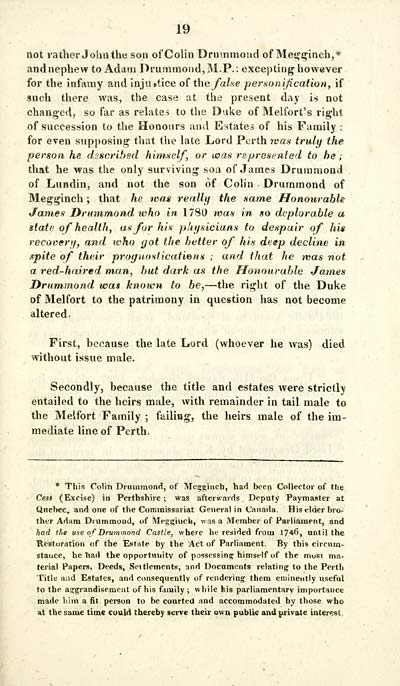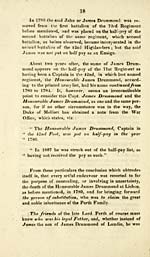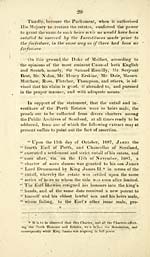Detection of infamy
(35) Page 19
Download files
Complete book:
Individual page:
Thumbnail gallery: Grid view | List view

19
not rather John the son of Colin Drummond of Megginch,*
and nephew to Adam Drummond, M. P.: excepting 1 however
for the infamy and inju»tice of the false personification , if
such there was, the case at the present day is not
changed, so far as relates to the Duke of Melfort's right
of succession to the Honours and Estates of his Family ;
for even supposing that the late Lord Perth was truly the
person he described himself, or was represented to he ;
that he was the only surviving son of James Drummond
of Lundin, and not the son of Colin Drummond of
Megginch ; that he was really the same Honourable
James Drummond who in 1780 was in so deplorable a
state of health, as for his physicians to despair of his
recovery, and who got the better of his deep decline in
.tpite of their prognostications ; and that he was not
a red-haired man, but dark as the Honourable James
Drummond was known to be, — the right of the Duke
of Melfort to the patrimony in question has not become
altered.
First, because the late Lord (whoever he was) died
without issue male.
Secondly, because the title and estates were strictly
entailed to the heirs male, with remainder in tail male to
the Melfort Family ; failing, the heirs male of the im-
mediate line of Perth.
* This Colin Drummond, of Megginch, had been Collector of the
Cess (Excise) in Perthshire ; was afterwards Deputy Paymaster at
Quebec, and one of the Commissariat General in Canada. His elder bro-
ther Adam Drummond, of Meggiuch, was a Member of Parliament, and
had the use of Drummond Castle, where he resided from 17*6, until the
Restoration of the Estate by the Act of Parliament. By this circum-
stance, he had the opportunity of possessing himself of the must ma-
terial Papers, Deeds, Seitlements, and Documents relating to the Perth
Title and Estates, and consequently of rendering them eminently useful
to the aggrandisement of bis family; while his parliamentary importance
made him a fit person to be courted and accommodated by those who
at the same time could thereby serve their own public and private interest
not rather John the son of Colin Drummond of Megginch,*
and nephew to Adam Drummond, M. P.: excepting 1 however
for the infamy and inju»tice of the false personification , if
such there was, the case at the present day is not
changed, so far as relates to the Duke of Melfort's right
of succession to the Honours and Estates of his Family ;
for even supposing that the late Lord Perth was truly the
person he described himself, or was represented to he ;
that he was the only surviving son of James Drummond
of Lundin, and not the son of Colin Drummond of
Megginch ; that he was really the same Honourable
James Drummond who in 1780 was in so deplorable a
state of health, as for his physicians to despair of his
recovery, and who got the better of his deep decline in
.tpite of their prognostications ; and that he was not
a red-haired man, but dark as the Honourable James
Drummond was known to be, — the right of the Duke
of Melfort to the patrimony in question has not become
altered.
First, because the late Lord (whoever he was) died
without issue male.
Secondly, because the title and estates were strictly
entailed to the heirs male, with remainder in tail male to
the Melfort Family ; failing, the heirs male of the im-
mediate line of Perth.
* This Colin Drummond, of Megginch, had been Collector of the
Cess (Excise) in Perthshire ; was afterwards Deputy Paymaster at
Quebec, and one of the Commissariat General in Canada. His elder bro-
ther Adam Drummond, of Meggiuch, was a Member of Parliament, and
had the use of Drummond Castle, where he resided from 17*6, until the
Restoration of the Estate by the Act of Parliament. By this circum-
stance, he had the opportunity of possessing himself of the must ma-
terial Papers, Deeds, Seitlements, and Documents relating to the Perth
Title and Estates, and consequently of rendering them eminently useful
to the aggrandisement of bis family; while his parliamentary importance
made him a fit person to be courted and accommodated by those who
at the same time could thereby serve their own public and private interest
Set display mode to:
![]() Universal Viewer |
Universal Viewer | ![]() Mirador |
Large image | Transcription
Mirador |
Large image | Transcription
Images and transcriptions on this page, including medium image downloads, may be used under the Creative Commons Attribution 4.0 International Licence unless otherwise stated. ![]()
| Histories of Scottish families > Detection of infamy > (35) Page 19 |
|---|
| Permanent URL | https://digital.nls.uk/95118050 |
|---|
| Description | A selection of almost 400 printed items relating to the history of Scottish families, mostly dating from the 19th and early 20th centuries. Includes memoirs, genealogies and clan histories, with a few produced by emigrant families. The earliest family history goes back to AD 916. |
|---|

